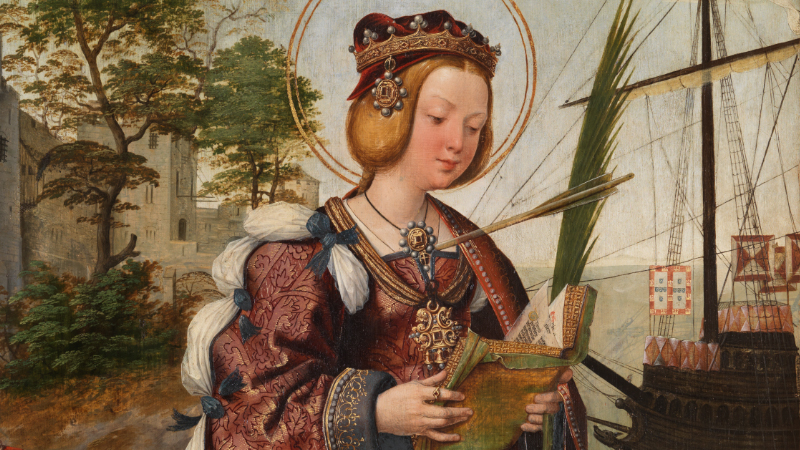This exhibition is the first opportunity for visitors to the Louvre to discover the elegant and accomplished art of the painters who were active in Lisbon in the first half of the 16th century.
Thanks to the patronage of kings Manuel I (reigned 1495–1521) and João III (reigned 1521–1557), who surrounded themselves with court painters, the Portuguese school of painting experienced a golden age.
Capital of the vast Portuguese empire, Lisbon was then a multicultural city turned towards the ocean which carried wealth and discoveries from the New World into Europe.
After the early accomplishments of Nuno Gonçalves (active 1450–before 1492), the Lisbon workshops, centred around Jorge Afonso (active 1504–1540), adopted a new way of painting inspired by the inventions of the Flemish painters. The works of the Portuguese artists feature poetic, blue-toned landscapes, precious fabrics and accessories and elegant architectural details, and reflect their keen and sometimes humorous powers of observation and narration. The exhibition pays tribute to this extraordinary synthesis of Flemish and Italian Renaissance creativity and Portuguese culture.
Exhibition curators:
Exhibition curators:
Charlotte Chastel-Rousseau, curator in the Department of Paintings, Musée du Louvre
Joaquim Oliveira Caetano, director of the Museu Nacional de Arte Antiga in Lisbon
(Exhibition in other venue) | Exhibition address
Musée du Louvre (Room 831, Richelieu wing, Piso 2)
+INFO
Organising institutions:
Joaquim Oliveira Caetano, director of the Museu Nacional de Arte Antiga in Lisbon
(Exhibition in other venue) | Exhibition address
Musée du Louvre (Room 831, Richelieu wing, Piso 2)
+INFO
Organising institutions:
The Musée du Louvre, the French Republic, the Institut Français, the Portuguese Republic, Camões – Instituto da Cooperação e da Língua, the Gabinete de Estratégia, Planeamento e Avaliação Culturais, the Direção-Geral do Patrimonio Cultural and the Museu Nacional de Arte Antiga.
Sponsor Committee of the France–Portugal Season 2022:
Sponsor Committee of the France–Portugal Season 2022:
BNP Paribas, Crédit Agricole, Inetum, TotalEnergies, VINCI Airports, LVMH, Saint-Gobain, Euronext, AR France Invest, Banque BCP, the Fondation Engie, the Fundação Millenium BCP, the French Republic, the Institut Français, the Portuguese Republic, Camões – Instituto da Cooperação e da Língua, the Gabinete de Estratégia, Planeamento e Avaliação Culturais, the Direção-Geral do Patrimonio Cultural and the Museu Nacional de Arte Antiga.

